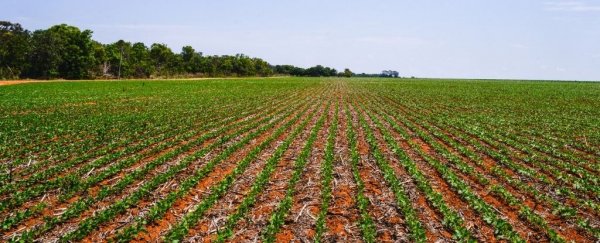National climate plans often fail to prioritize food systems, and a new report from the Global Alliance for the Future of Food warns that's a lost opportunity.
If the world can change the way it produces, distributes, consumes, and disposes of food, estimates show we can reduce greenhouse gas emissions by at least 10.3 billion metric tons a year. That alone would get us 20 percent of the way to the Paris Climate Agreement's 2050 goals.
The new report carefully considered the climate plans of China, the United States, Canada, the United Kingdom, France, Germany, Spain, Bangladesh, Colombia, Egypt, Kenya, Senegal, South Africa, and Vanuatu.
Apart from France, Germany, and the United States, none of the other countries explicitly included efforts to promote sustainable diets in their commitments, even though studies show this can significantly reduce emissions.
What's more, no nation has fully considered the emissions of food imports, or the way they can drive deforestation and habitat destruction elsewhere in the world.
"Integrating food systems transformation into the Nationally Determined Contributions (NDCs) – the national climate actions at the heart of the Paris Agreement, is critical to delivering on interconnected ecological, biodiversity, health, economic, social, and cultural goals," the US section of the report reads.
"Taking a food systems approach builds climate resilience and results in a diversity of context-specific solutions for food production, distribution, consumption, and waste. Yet, food systems are rarely prioritized in climate policy."
Land in the US is considered one of the most fertile areas in the world, and food systems here represent a major source of greenhouse gas emissions.
The latest US climate plans submitted to the United Nations do account for carbon dioxide emissions from the land sector, but they do not explicitly include plans for changing diets or reducing food waste.
The UK, in contrast to the US, has a large overseas land footprint. Its demands are putting pressure on natural ecosystems elsewhere, and according to the report, UK national climate plans aren't doing enough to mitigate this international impact.
The UK plans are also based on unclear advice and analysis from within the government. The data have not been made publicly available.
The European Union Green Deal has a 'farm to fork' strategy aimed to improve food production, transport, and waste, but EU climate plans submitted to the UN do not explicitly mention food, diets, or food waste.
"This may be reflective of the fact that EU-level legislation is not intended to be very prescriptive about actions and measures," the report admits, "rather allowing space for Member States to develop policies that are suited to their national circumstances to implement EU-level targets."
China is the world's largest food producer. The nation's food systems must feed 1.4 billion people, and as local meat demands continue to rapidly climb, China has had to import vast amounts of soybeans to feed its livestock. This, in turn, has led to increased deforestation overseas, especially in South America.
The damage at home is also detrimental. In the future, some of the most fertile parts of China are at risk from climate change. They could even run dry within 30 years. Yet the current report found China's climate plans make no obvious mention of any food system assessments or issues.
"According to one interviewee, this omission is mainly because China's [national determined contribution] primarily addressed the 2030 climate goal which prioritizes energy-related CO2 emissions," the report explains.
The authors also point out that the sheer lack of data could be contributing to the omission. So far, they say, there has been no extensive research done to address China's food systems. In fact, only a few studies on this topic currently exist.
Of all the countries compared in the report, Columbia, Senegal, and Kenya were said to have the most ambitious plans. These nations were especially focused on promoting sustainable farming practices and improving locally-led agriculture.
In Kenya, for instance, national climate plans include measures to build climate resilience through sustainable land use management. Climate change funds have also created safety nets and extension services to ensure marginalized communities have what they need to succeed.
In Senegal, where over half the population is employed in agriculture, climate plans for food systems are particularly detailed.
It is one of the only nations with a climate plan that includes gender equality as a form of sustainable development, according to the report. That said, the authors argue Senegal's plan could add more detail on how women and rural communities "can act as agents of change in the shift toward sustainable agriculture and healthy diets."
Even the most comprehensive climate plans show room for improvement. Humans must eat to live, but if we can fix food systems to be more sustainable, it could go a long way towards ensuring climate resilience.
The world can't afford to miss out.
The report can be found on the Global Alliance for the Future of Food's website.
